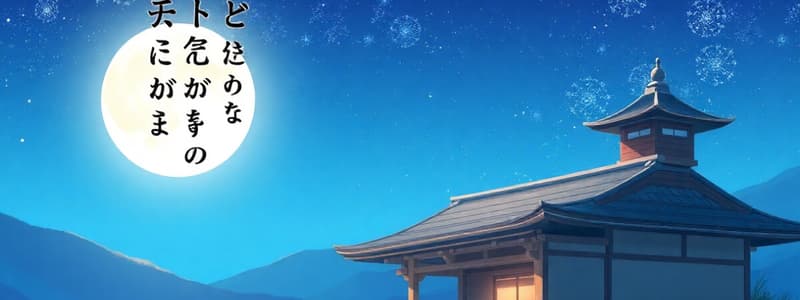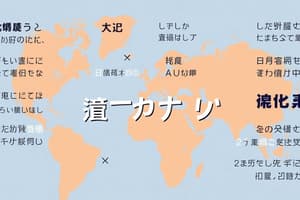Podcast
Questions and Answers
What does 'gakusei' mean in English?
What does 'gakusei' mean in English?
- Student (correct)
- Hobby
- Teacher
- Name
'Desu' means 'are' in Japanese.
'Desu' means 'are' in Japanese.
True (A)
How do you say 'hobby' in Japanese?
How do you say 'hobby' in Japanese?
shumi
I am ___ years old.
I am ___ years old.
Match the following Japanese hobbies with their English translations:
Match the following Japanese hobbies with their English translations:
What does 'nijuu san' represent?
What does 'nijuu san' represent?
The Japanese numeral for 10 is 'juu'.
The Japanese numeral for 10 is 'juu'.
What is the Japanese term for 'computer'?
What is the Japanese term for 'computer'?
I came from ______.
I came from ______.
How do you translate 'I am a student at STI' into Japanese?
How do you translate 'I am a student at STI' into Japanese?
Which of the following companies is NOT mentioned as a leading Japanese firm?
Which of the following companies is NOT mentioned as a leading Japanese firm?
Japanese is one of the most used languages on the internet.
Japanese is one of the most used languages on the internet.
What is the Japanese phrase for 'Please repeat after me'?
What is the Japanese phrase for 'Please repeat after me'?
Japan is the ___ largest economy in the world.
Japan is the ___ largest economy in the world.
Match the following expressions with their meanings:
Match the following expressions with their meanings:
Which of these statements about Japanese cultural exports is correct?
Which of these statements about Japanese cultural exports is correct?
International tourism is irrelevant to Japanese culture.
International tourism is irrelevant to Japanese culture.
Translate 'I am thirsty' into Japanese.
Translate 'I am thirsty' into Japanese.
___ shimashou means 'Let's check'.
___ shimashou means 'Let's check'.
Which of the following options indicates a firm belief that one understands?
Which of the following options indicates a firm belief that one understands?
Flashcards
Hajimemashite
Hajimemashite
A phrase used as 'How do you do?' during self-introduction.
Douzo yoroshiku onegaishimasu
Douzo yoroshiku onegaishimasu
A polite phrase meaning 'Pleased to meet you'.
Desu
Desu
Indicates what the subject is or identifies it such as 'is', 'am', or 'are'.
Watashi no namae wa ___ desu
Watashi no namae wa ___ desu
Signup and view all the flashcards
Gakusei
Gakusei
Signup and view all the flashcards
Sensei / Kyoushi
Sensei / Kyoushi
Signup and view all the flashcards
Shumi
Shumi
Signup and view all the flashcards
Namae
Namae
Signup and view all the flashcards
Ichi
Ichi
Signup and view all the flashcards
Ni
Ni
Signup and view all the flashcards
San
San
Signup and view all the flashcards
Yon/Shi
Yon/Shi
Signup and view all the flashcards
Go
Go
Signup and view all the flashcards
Roku
Roku
Signup and view all the flashcards
Nana/Shichi
Nana/Shichi
Signup and view all the flashcards
Hachi
Hachi
Signup and view all the flashcards
Kyuu/Ku
Kyuu/Ku
Signup and view all the flashcards
Juu
Juu
Signup and view all the flashcards
Hajimemashou
Hajimemashou
Signup and view all the flashcards
Owarimashou
Owarimashou
Signup and view all the flashcards
Study Notes
Self-Introduction (Jikoshoukai)
- Key phrases for self-introduction include "Hajimemashite" (How do you do?) and "Douzo yoroshiku onegaishimasu" (Pleased to meet you).
- Structure of introduction: Name, nickname, origin, age, school, and hobbies.
- Practice using "Watashi no namae wa ___ desu" (My name is ___).
Vocabulary
- Gakusei - Student
- Sensei / Kyoushi - Teacher
- Shumi - Hobby
- Namae - Name
- Desu - Is/Am/Are
- "Watashi wa ___ desu" - I am ___
Numbers (Suuji)
- Basic numbers in Japanese:
- 1: Ichi
- 2: Ni
- 3: San
- 4: Yon/Shi
- 5: Go
- 6: Roku
- 7: Nana/Shichi
- 8: Hachi
- 9: Kyuu/Ku
- 10: Juu
- Combinations:
- Juu + 1 = Juichi (11)
- Juu + 2 = Juuni (12)
- 2 x 10 = Nijuu (20)
- 3 x 10 = Sanjuu (30)
Age Expressions
- Telling age follows the structure # + sai.
- Examples:
- 16 years old: Juuroku sai
- 23 years old: Nijuu san sai
- Special readings:
- 11: Juuisai
- 18: Juuhassai
- 20: Hatachi
Hobbies (Shumi)
- Common hobbies:
- TEREBI - Watching television
- ONGAKU - Listening to music
- DOKUSHO - Reading
- SUPO-TSU - Sports
- RYOURI - Cooking
- KOMPYU-TA - Computer
- EIGA - Watching movies
- GITA - Playing guitar/piano
- KAKU KOTO - Writing
Importance of Studying Japanese
- Japan ranks as the 4th largest global economy.
- Major companies: SONY, Canon, Panasonic, Honda, Toyota, Mitsubishi.
- Knowledge of Japanese provides significant business opportunities.
- Japanese is widely used online and is integral to cultural exports.
- Japan attracts many international tourists.
Classroom Expressions
- Hajimemashou - Let’s start
- Owarimashou - Let’s end
- Wakarimasu ka? - Do you understand?
- Hai, wakarimasu - Yes, I do; Iie, wakarimasen - No, I don’t.
- Mou ichido onegaishimasu - Once more please.
Additional Classroom Commands
- Kaite kudasai - Please write.
- Kiite kudasai - Please listen.
- Tatte kudasai - Please stand; Suwatte kudasai - Please sit.
- Obstentations for volume: "Ookii koe de hanashite kudasai" - Please speak loudly.
Additional Expressions
- Onaka ga sukimashita - I am hungry.
- Onaka ga ippai desu - I am full.
- Nodo ga kawakimashita - I am thirsty.
- Byouki desu - I am sick.
- Nemutai desu - I am sleepy.
Studying That Suits You
Use AI to generate personalized quizzes and flashcards to suit your learning preferences.




